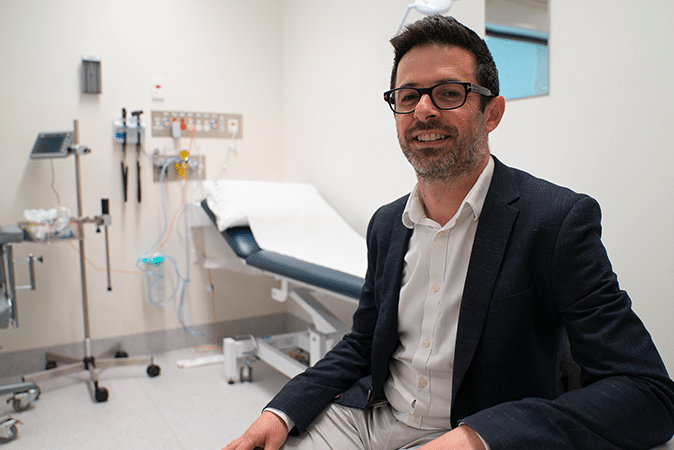American Society of Clinical Oncology 2020
The American Society of Clinical Oncology (ASCO) congress is the largest cancer conference in the world, bringing together the world’s most reputable cancer researchers, patient advocates and industry professionals, including those from Breast Cancer Trials, to discuss the latest advancements in cancer treatments, clinical trials research and cancer care.
This year, due to COVID-19 restrictions, the conference went online, with delegates logging in at all hours of the day around the world to attend sessions and lectures.
We have provided a summary of the key breast cancer clinical trials research presented:
KEYNOTE355 Clinical Trial Shows Positive Survival Data For Metastatic Triple Negative Breast Cancer
The KEYNOTE355 clinical trial was a phase three trial that evaluated an immunotherapy drug (pembrolizumab) in combination with (one of three) chemotherapy drug regimens, compared to those chemotherapy drugs alone.
This trial was open to patients with inoperable locally recurrent or metastatic triple negative breast cancer. This means the patients’ cancer has come back after treatment or has spread to other parts of the body and is unable to be removed in an operation.
Results presented at ASCO 2020 show that in patients with programmed cell death ligand (PD-L1) positive tumours with a combined positive score (CPS) equal to or more than 10, the immunotherapy plus chemotherapy treatment led to a statistically significant and clinically meaningful improvement in the amount of time patients lived without progression of their cancer.
This combination of treatment reduced the risk of disease progression or death by 35% and improved the progression-free survival to an average of 9.7 months compared to the 5.6 months for patients receiving only chemotherapy. There were some additional, manageable, immune related side effects seen with pembrolizumab.
The researchers and clinicians who worked on this trial believe that if approved, this new treatment combination could provide a new option for first-line treatment to certain patients with hard-to-treat triple-negative breast cancer.
Should The Primary Breast Cancer Be Removed In Patients Who Have Distant Metastases At The Time Of Diagnosis?
This is a question that patients and doctors frequently discuss in the clinic. Women who present with a new diagnosis of breast cancer that is already at an advanced stage (stage IV) face the question about whether surgery and radiation to the tumour of the breast (local therapy) will prolong survival compared to the traditional treatment of systemic treatment (chemotherapy or endocrine therapy) alone. The question comes down to concern about whether the primary cancer contributes to further progression of distant disease.
Data from the E2108 randomised phase three trial, presented at ASCO 2020, show that the survival experience of the two treatments was the same. Patients all started with systemic therapy, and those who had stable or responding disease were then randomised to receive surgery to the breast primary, followed by ongoing systemic therapy, or to ongoing systemic therapy alone.
Those patients who received local therapy did not survive for any longer than those who did not. It shows that surgery and radiation should not be offered to these patients with the expectation of improved survival. There may still be specific situations where surgery and/or radiotherapy to the breast may be worthwhile for patients with metastatic breast cancer, particularly if it is causing localised symptoms that are not controlled by systemic therapy. In addition, quality of life was worse in the patients who had surgery, despite having less locoregional progression.
Improved Survival For Patients With HER2 Positive Breast Cancer With Brain Metastases
Results of the HER2CLIMB clinical trial were presented at ASCO2020 showed remarkable results for patients with HER2 positive breast cancer with brain metastases. This type of cancer is often difficult to control when it has spread to the brain, resulting in short survival times.
The HER2CLIMB clinical trial was a randomised phase 2 trial which evaluated the addition of an oral drug (tucatinib) to treatment with Capecitabine and trastuzumab in patients with advanced HER2+ breast cancer that had spread to other parts of the body. The overall results have already been published, showing tucatinib prolongs survival in patients with metastatic HER2 positive breast cancer. The results presented at ASCO2020 focused on patients whose breast cancer had metastasised to the brain.
These results showed an overall survival benefit in this group of patients, which is around 50% of all HER2 positive metastatic breast cancer. The investigators found that in patients with heavily pre-treated, HER2 positive metastatic breast cancer with brain metastasis, the addition of the drug tucatinib to the combination of trastuzumab and capecitabine doubled the intracranial overall response rate, reduced the risk of intracranial progression or death by two-thirds and reduced the risk of death by half. It was also effective for patients without brain metastases.
Trastuzumab Does Not Reduce The Risk Of Recurrence For Women With HER2-Positive DCIS
Trastuzumab, one of the drugs used in the HER2CLIMB trial discussed above, was also used in the NSABP B-43 clinical trial. Trastuzumab is an established drug that reduces recurrence and prolongs disease control in early stage and metastatic HER2 positive invasive breast cancer, respectively.
The aim of this clinical trial was to see if the addition of trastuzumab to radiotherapy would reduce the pre-cancerous (DCIS) or invasive breast cancer recurrence rate for women who have had surgical removal of HER2 positive ductal carcinoma in situ (DCIS). The investigators hoped it would reduce the rate of recurrence by at least 36%, however results presented at ASCO 2020 showed it did not reach this threshold.
BYLIEVE Results Show Treatment Combination Improves Progression Free Survival For Patients With Metastatic ER-Positive, PIK3CA Mutant Breast Cancer
PIK3CA mutations are found in the tumours of approximately 40% of patients with hormone receptor-positive, HER2-negative advanced breast cancer, and is associated with treatment resistance and poor outcomes. The BYLIEVE clinical trial treated patients with metastatic hormone receptor-positive, PIK3CA mutant breast cancer with the combination of alpelisib, an alpha-specific PI3K inhibitor, and fulvestrant after prior aromatase inhibitor and CDK4/6 inhibitor treatment.
The results, presented at ASCO 2020, showed that the trial met its primary objective, with 50% of patients alive and progression free at six months. Some toxicity was identified (diarrhoea, hyperglycaemia, nausea, rash), but discontinuation due to toxicity was low, suggesting that it is manageable.
This trial result is of great interest to Breast Cancer Trials as the CAPTURE clinical trial, due to open in late 2020, will use the same combination of alpelisib and fulvestrant in patients with hormone receptor-positive HER2-negative advanced breast cancer who have a PIK3CA mutation in their blood, according to testing of circulating DNA.
While BYLIEVE was a single-arm trial, the CAPTURE trial will compare this treatment to capecitabine, which is a currently used treatment option. Such comparative trial designs are the accepted standard for moving new medications or combinations towards routine clinical use.
QUICK ACCESS
American Society Of Clinical Oncology 2020
KEYNOTE355 Clinical Trial Shows Positive Survival Data For Metastatic Triple Negative Breast Cancer
Improved Survival For Patients With HER2 Positive Breast Cancer With Brain Metastases
Trastuzumab Does Not Reduce The Risk Of Recurrence For Women With HER@-Positive DCIS
Support Us
Help us to change lives through breast cancer clinical trials research



